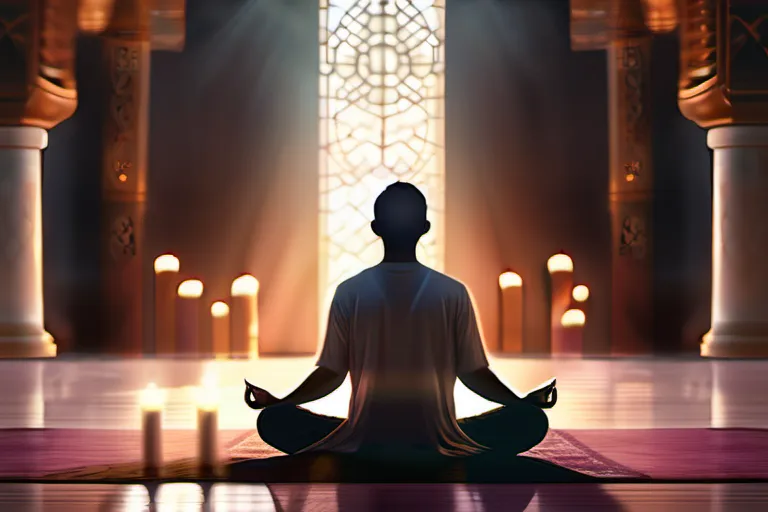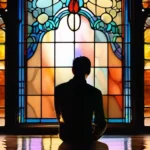Explore the role of religion in shaping personal values, finding purpose, and fostering community.
In this article, we delve into the age-old question: is religion necessary for a meaningful life? We’ll examine the historical, philosophical, and psychological perspectives on this topic, providing you with a well-rounded understanding of its significance in human existence.
The Historical Role of Religion
The historical role of religion has been like a vast river, shaping the course of human societies and cultures for millennia. Can we imagine life without these spiritual waters? For centuries, religion has provided a moral compass, guiding individuals to navigate the complexities of existence. How did this happen? Through a tapestry woven with stories, rituals, and shared beliefs.
Imagine a bustling city in ancient times, where every corner held a sacred temple or shrine. These places were not just centers for worship but also hubs of social interaction, education, and community support. Religion offered people a sense of belonging, giving them a place to find solace and purpose. Is it any wonder then that societies have always sought guidance from these spiritual frameworks?
Over time, religion evolved like a living organism, adapting to new challenges and contexts. From the rigid structures of the Middle Ages to the more flexible interpretations in modern times, religious practices continue to shape our values and behaviors. Yet, as society progresses, some wonder if religion is still necessary for a meaningful life. Does its role remain essential, or has it become outdated?
Consider how different religions have influenced art, literature, and philosophy throughout history. The Bible, the Quran, and sacred texts of other traditions have inspired countless works that continue to resonate today. Religion has not only provided moral guidance but also enriched our cultural landscape with profound insights and artistic expressions. Could we imagine these aspects of human culture without the influence of religion?
As we ponder the necessity of religion in a modern world, it is crucial to recognize its enduring impact on shaping personal values, finding purpose, and fostering community. Whether or not one adheres to religious beliefs, the legacy of these spiritual traditions continues to shape our understanding of what it means to be human. In exploring this question, we embark on a journey through time, reflecting on the profound influence that religion has had on the very fabric of society.
Philosophical Perspectives on Religion
Is religion necessary for a meaningful life? Philosophers throughout history have grappled with this question, offering diverse viewpoints that shape our understanding of human existence. Some argue that religion provides a framework for moral behavior and ethical living, while others contend that it can be a source of division and conflict.
Let’s delve into some key philosophical perspectives on the role of religion in human life. The utilitarian philosopher Jeremy Bentham famously criticized religion as a mere superstition, suggesting that its benefits could be achieved through more rational means. But if we were to strip away all religious doctrines, would we truly lose something essential?
On the other hand, Immanuel Kant believed that religion serves an important role in helping individuals align their actions with moral imperatives. He saw it as a guide for leading a virtuous life and maintaining a sense of purpose beyond the material world. Could this be true? Is there a way to find meaning without relying on divine commandments?
The existentialist Jean-Paul Sartre took a different stance, arguing that religion is an obstacle to authentic living. He believed that individuals should take responsibility for their own existence and not rely on external beliefs. Does this mean that a life devoid of religious teachings lacks purpose? Or can one find meaning in self-determination?
Consider the metaphor of a compass: does religion provide a reliable direction for navigating life’s complexities, or is it more like a heavy anchor dragging us down? Proponents argue that religious practices and beliefs offer comfort and guidance during times of distress. Critics counter that these same structures can stifle personal freedom and creativity.
Ultimately, the necessity of religion in finding meaning may depend on individual experiences and needs. While some find solace in organized worship and community support, others may discover their purpose through secular means such as science, philosophy, or art. What do you think? Could a life without religion still be fulfilling?
Psychological Aspects of Religion
Is religion necessary for a meaningful life? Some might argue that it’s a question as old as time itself, much like asking whether love is essential for human existence. When we delve into the psychological aspects of religion, we uncover layers of impact that can significantly shape our mental health and well-being.
Firstly, consider the role of religion in providing structure to life. Just as a lighthouse guides ships through treacherous waters, religious beliefs often serve as beacons, offering direction amidst life’s uncertainties. These beliefs can anchor individuals, giving them a sense of purpose and meaning that might otherwise be elusive.
Mental health is another critical area where religion plays a profound role. Research has shown that people who practice their faith tend to report lower levels of depression and anxiety. This isn’t merely a placebo effect; the act of praying or meditating can trigger the release of endorphins, akin to nature’s way of providing its own form of antidepressant.
Moreover, religion fosters a strong sense of community, which is vital for our psychological well-being. Think about it—religion often brings people together in shared rituals and practices. This communal aspect can provide support systems that are invaluable during times of stress or crisis. Like a tree with deep roots, individuals can find strength by being part of something larger than themselves.
But what happens when someone questions the necessity of religion for their life? It’s akin to questioning whether water is essential after spending days lost in a desert. For many, abandoning religious beliefs can lead to feelings of emptiness or even existential crises. It’s not just about losing a set of doctrines but potentially losing a whole framework that has shaped one’s identity and purpose.
So, is religion necessary for a meaningful life? Perhaps it depends on who you ask. For some, the answer might lie in the comfort and support provided by religious practices; for others, it could be found in alternative forms of belief or non-belief systems. What’s certain is that exploring this question can lead to deeper self-discovery and understanding of one’s own values and beliefs.
Religion and Personal Values
Is religion necessary for a meaningful life? That’s a question many have pondered, often finding themselves at a crossroads between personal beliefs and societal expectations. Religion can be seen as a lighthouse guiding one’s moral compass, but is it merely a beacon in the stormy sea of life or does it hold a more profound role?
Take a moment to consider how religion shapes your values. Are the principles you live by influenced by religious teachings? Many find that religious practices offer a framework for making decisions, like choosing between right and wrong in complex situations. It’s akin to having a map when navigating unfamiliar terrain; it provides a sense of direction.
Imagine you’re lost in a dense forest. A religion might be the thick branch you grab onto, providing stability and direction as you find your way out. Without this support, one might feel adrift, unsure of where to turn or what path to follow. Religious texts often present moral guidelines that can be applied to everyday life, helping individuals make choices that align with their beliefs.
Moreover, religion fosters a sense of community, a group that shares common values and practices. This connection is vital for many, offering support and a network of like-minded individuals. It’s the difference between being an island and part of a larger archipelago. When you join forces with others who share your faith, it can amplify your impact and provide a collective sense of purpose.
Consider how religion has influenced your personal values. Do you find yourself aligning your actions with religious teachings? How do these beliefs affect your interactions with others and your approach to the world around you?
The role of religion in shaping one’s personal values is undeniable, providing a moral foundation and a sense of community. While not everyone finds the same value in it, for many, religion serves as an essential part of their journey towards a meaningful life.
Finding Purpose through Religion
Is religion necessary for finding purpose in life? The question itself is like asking if a lighthouse is needed to guide ships through treacherous waters—obvious, but complex. Just as a lighthouse illuminates the path ahead and provides hope during storms, religion can offer direction and comfort when navigating life’s tumultuous seas.
Imagine you’re a wanderer in an unfamiliar land, seeking meaning and purpose. Religion often serves as a beacon, offering frameworks and narratives that help us understand our place in the world. It provides stories of heroes who faced trials and triumphs, guiding us on how to live meaningful lives despite the challenges we encounter.
Moreover, religion can instill a sense of direction by aligning personal goals with broader cosmic or spiritual purposes. Many faiths emphasize the importance of service, charity, and moral integrity as pathways to fulfillment. These values can be seen as the north star that keeps us from getting lost in life’s fog.
Consider the metaphorical journey: Just as a hiker relies on maps and guides to reach their destination, individuals may rely on religious teachings to find direction and meaning. These teachings often outline what is right and wrong, helping to create a moral compass that can be invaluable during times of uncertainty.
But religion’s role in finding purpose isn’t just about following rules or adhering to dogma. It’s also about the emotional support it provides. In moments of despair or doubt, religious communities offer a sense of belonging and shared experience. They remind us that we are not alone in our struggles and that there is a collective wisdom that can guide us.
So, while religion may not be necessary for everyone, its potential to provide a framework for purpose and direction cannot be ignored. It’s like having a map to explore the vast landscapes of life; it makes the journey less daunting and more meaningful.
Religion and Community Building
How does religion shape our social fabric? Is it merely a tool for personal belief, or does it play a crucial role in community building? Religion often acts as a glue that binds people together, creating a sense of belonging and fostering social cohesion. Imagine a garden where each flower represents an individual’s unique beliefs and values. Now, consider the religion as the soil that nourishes these flowers, allowing them to grow and thrive in harmony.
Religion provides a framework for understanding one’s place within a broader community. It offers a shared language and set of practices that facilitate communication and interaction among members. For instance, think about a weekly service where people gather not just to pray but also to socialize and support each other. These gatherings create opportunities for forming deep connections and strengthening bonds.
Moreover, religion can be seen as a bridge connecting different communities. It often transcends ethnic and national boundaries, promoting peace and understanding between diverse groups. Consider the role of interfaith dialogue events; they bring people from various religious backgrounds together to discuss common values and shared human aspirations. This exchange not only enriches individual perspectives but also contributes to building a more inclusive society.
However, it is important to note that while religion can serve as a powerful force for good, its misuse or abuse can lead to division rather than unity. The key lies in how communities interpret and apply religious teachings. When used positively, religion can inspire acts of charity, foster compassion, and encourage ethical behavior. But when rigid dogmas are enforced without empathy, it can create barriers between people.
In essence, the role of religion in community building is multifaceted and deeply significant. It offers more than just a sense of purpose; it shapes our interactions with others and contributes to the tapestry of human society. So, as we navigate through life’s complexities, might we also consider how the threads of religion can weave together our communities into something beautiful and enduring?
Conclusion
 By the end of this article, you’ll have a deeper appreciation for the role religion plays in shaping our lives and will be equipped to make informed decisions about its place in your own journey towards meaning and purpose.
By the end of this article, you’ll have a deeper appreciation for the role religion plays in shaping our lives and will be equipped to make informed decisions about its place in your own journey towards meaning and purpose.











